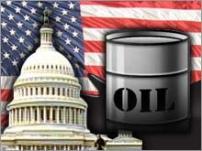 The US House of Representatives missed an important opportunity to end oil aid in a bill [Acrobat pdf] that will “re-authorize” the Overseas Private Investment Corporation (OPIC) – one of two agencies in the US government that uses taxpayer dollars to provide financing, insurance and guarantees to US businesses wanting to expand their operations in foreign countries.
The US House of Representatives missed an important opportunity to end oil aid in a bill [Acrobat pdf] that will “re-authorize” the Overseas Private Investment Corporation (OPIC) – one of two agencies in the US government that uses taxpayer dollars to provide financing, insurance and guarantees to US businesses wanting to expand their operations in foreign countries.
The bill’s report language “discourages” OPIC from providing any assistance “for projects that involve the development, extraction, processing or transportation of crude oil.” It also states that “limited public resources for foreign assistance should focus on the many critical needs of development countries” and “extractive industries have significant access to private capital markets and increasingly do not need OPIC assistance.” While these are important and significant assertions, unfortunately, the report language is non-binding, acting as guidelines to OPIC rather than legal mandates.
This year, the House could have taken an important step to close loopholes in OPIC statute which, despite restrictions on directly financing the surveying and extraction of oil, allow indirect financing of these activities and the provision of any type of support for other oil-related operations. For example, in 2005 alone OPIC provided $580 million in support for oil and gas projects, including direct financing for pipelines. In the past several years, OPIC has used public funds to subsidize the overseas operations of many oil giants such as Exxon, BP and Unocal/Chevron.
The OPIC Reauthorization Bill (H.R. 2798) [Acrobat pdf], passed by the House on Monday and now being debated in the Senate, not only fails to rollback subsidies to the international oil industry, but falls short when it comes to clear directives in other areas:
- While the House bill mandates that OPIC “establish a goal of substantially increasing its support of projects that use, develop, or other-wise promote the use of clean energy technologies” [emphasis added] it fails to clearly define a portfolio target, giving large discretion to OPIC to determine what is meant by a “substantial increase.”
- While the House bill require that OPIC notify Congressional committees 30 days before providing support to a project in the extractive industries, this only applies to projects in which OPIC assistance is valued at $10,000,000 or more. This is a seemingly high threshold.
- While the House bill requires that OPIC “gives preference to” a project in which both the investor and host country implement the internationally recognized Extractive Industries Transparency Initiative (EITI) principles, it only requires that either the investor or country meet EITI principles “or substantially similar principles and criteria.” As written, such a provision will do little to change the way OPIC currently operates.
It is disappointing that the House OPIC Reauthorization Bill could not make clear commitments around such things as a defined target for lending to renewable energy projects and phasing out support to oil companies which have adequate access to private capital. We can’t fight climate change and invest our public resource in clean, renewable energy technologies while, as the same time, continuing to subsidize the oil industry. While the US must carry the responsibility for lowering its own emissions, our public foreign assistance should be geared towards helping impoverished countries establish renewable energy infrastructure rather than following the current policy and creating an oil-based infrastructure that will result in these developing countries producing harmful greenhouse gases.
- See the entire bill: H.R. 2798 Overseas Private Investment Corporation Reauthorization Act of 2007. [Acrobat pdf] (See the end of the summary of Section 8, on page 20, for the language that “discourages” OPIC investment in oil operations.)
- See an IPS article on the bill: OPIC Extension Tied to Terror and Environment.

why was brazil able to so easily change over
and yet we and others can not?
what are theh politics preventing it?
who is behind them and why arent people making all that very clear?
whyis ther soo much money inthe black hole of thh middle east and none to do alternative development?
isnt gettng into debt fro a failing resource less attrctive than getting into debt to build new means and infastructure
the hanging onto things that are clearly a problem and to disappear i dont understand..
wouldn’t much of the problems in the middle east go away if there was less reliance on oil? or would alternatives that reduce big profits fro the wealthy push them to create and use terriorists more?
That’s like saying because phelps works out in a huge, olympic size pool he should justify wasting all that extra water by working for the peace corp helping third world countries build wells for better water.